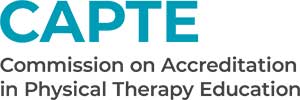Once admitted to the Doctor of Physical Therapy (DPT) program, students are eligible to apply for one of the two dual‑degree options.
One to two positions each year are available in the Doctor of Physical Therapy and Master of Public Health (DPT/MPH) dual‑degree option and one position is available in the Doctor of Physical Therapy and Doctor of Philosophy in Physical Rehabilitation Science (DPT/PhD) dual‑degree option.
These positions are competitive and will require completion of separate supplemental applications (to either the MPH or PhD programs). Completion of supplemental applications does not guarantee acceptance into the dual‑degree options.
The Doctor of Physical Therapy program at the University of Maryland School of Medicine is accredited by the CAPTE.
 Commission on Accreditation in Physical Therapy Education (CAPTE)
Commission on Accreditation in Physical Therapy Education (CAPTE)
3030 Potomac Ave, Suite 100
Alexandria, Virginia 22305-3085
Tel: 703-706-3245
Email: accreditation@apta.org
Web: www.capteonline.org
